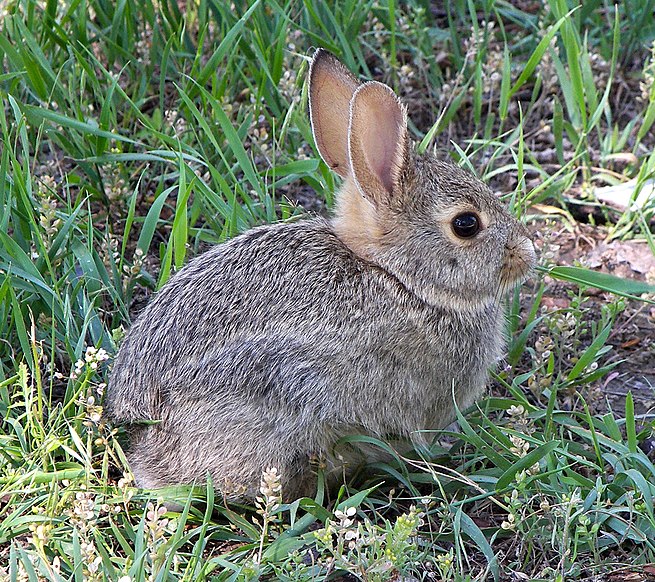Rabbitnoun
A mammal of the family Leporidae, with long ears, long hind legs and a short, fluffy tail.
Rabbitnoun
The fur of a rabbit typically used to imitate another animal's fur.
Rabbitnoun
A runner in a distance race whose goal is mainly to set the pace, either to tire a specific rival so that a teammate can win or to help another break a record; a pacesetter.
Rabbitnoun
(cricket) A very poor batsman; selected as a bowler or wicket-keeper.
Rabbitnoun
(comptheory) A large element at the beginning of a list of items to be bubble sorted, and thus tending to be quickly swapped into its correct position. Compare turtle.
Rabbitverb
(intransitive) To hunt rabbits.
Rabbitverb
To flee.
Rabbitverb
To talk incessantly and in a childish manner; to babble annoyingly.
Rabbitnoun
Any of the smaller species of the genus Lepus, especially the common European species (Lepus cuniculus), which is often kept as a pet, and has been introduced into many countries. It is remarkably prolific, and has become a pest in some parts of Australia and New Zealand.
Rabbitnoun
any of various burrowing animals of the family Leporidae having long ears and short tails; some domesticated and raised for pets or food
Rabbitnoun
the fur of a rabbit
Rabbitnoun
flesh of any of various rabbits or hares (wild or domesticated) eaten as food
Rabbitverb
hunt rabbits
Habitnoun
An action performed on a regular basis.
Habitnoun
An action performed repeatedly and automatically, usually without awareness.
Habitnoun
A long piece of clothing worn by monks and nuns.
Habitnoun
A piece of clothing worn uniformly for a specific activity.
Habitnoun
(archaic) Outward appearance; attire; dress.
Habitnoun
Form of growth or general appearance of a variety or species of plant or crystal.
Habitnoun
An addiction.
Habitverb
(transitive) To clothe.
Habitverb
To inhabit.
Habitnoun
The usual condition or state of a person or thing, either natural or acquired, regarded as something had, possessed, and firmly retained; as, a religious habit; his habit is morose; elms have a spreading habit; esp., physical temperament or constitution; as, a full habit of body.
Habitnoun
The general appearance and manner of life of a living organism.
Habitnoun
Fixed or established custom; ordinary course of conduct; practice; usage; hence, prominently, the involuntary tendency or aptitude to perform certain actions which is acquired by their frequent repetition; as, habit is second nature; also, peculiar ways of acting; characteristic forms of behavior.
Habitnoun
Outward appearance; attire; dress; hence, a garment; esp., a closely fitting garment or dress worn by ladies; as, a riding habit.
Habitnoun
The distinctive clothing worn commonly by nuns or monks; as, in the late 1900's many orders of nuns discarded their habits and began to dress as ordinary lay women.
Habitverb
To inhabit.
Habitverb
To dress; to clothe; to array.
Habitverb
To accustom; to habituate.
Habitnoun
an established custom;
Habitnoun
a pattern of behavior acquired through frequent repetition;
Habitnoun
(religion) a distinctive attire (as the costume of a religious order)
Habitnoun
excessive use of drugs
Habitverb
put a habit on
Habitnoun
a settled or regular tendency or practice, especially one that is hard to give up
Habitnoun
an addictive practice, especially one of taking drugs
Habitnoun
an automatic reaction to a specific situation.
Habitnoun
general shape or mode of growth, especially of a plant or a mineral
Habitnoun
a long, loose garment worn by a member of a religious order
Habitnoun
short for riding habit
Habitnoun
clothes
Habitnoun
a person's health or constitution
Habitverb
be dressed or clothed
Habit
A habit (or wont as a humorous and formal term) is a routine of behavior that is repeated regularly and tends to occur subconsciously.The American Journal of Psychology (1903) defined a Habitual behavior often goes unnoticed in persons exhibiting it, because a person does not need to engage in self-analysis when undertaking routine tasks. Habits are sometimes compulsory.




























